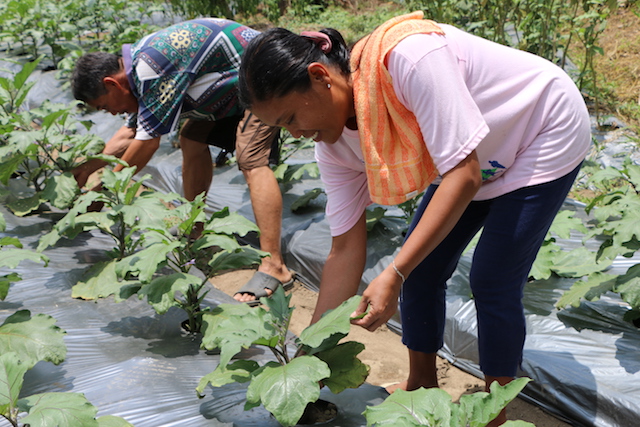Going organic
A farming community discovers the benefits of organic agriculture

EMBRACING NEW WAYS
Atienza shared that when he first introduced organic farming to the community, many doubted its effectiveness. They preferred to continue using synthetic fertilizers rather than trust a strange but natural technique. But there are a number of them who tried it and eventually proved that organic farming is as effective as conventional farming with less capital needed.
“Noong wala pa ang demo farm dito, kumukuha ang mga magsasaka ng mga punla ng talong galing pa sa Bulacan. Pero ngayon dito na sila kumukuha ng punla kaya hindi na sila nahihirapan. Mas mababa rin ang presyo ng punla dito sa demo farm dahil sa Bulacan ay Php180.00 per tray, samantalang dito sa amin ay Php150 lang, (Before the demo farm was introduced here, the farmers used to buy eggplant seedlings from Bulacan. But now they get their seedings here, because the price in Bulacan is Php180 per seedling tray while it is only Php150 here at the demo farm,)” he said.
Aside from helping the local farming community reduce their cropping cost, Atienza said that going organic will lessen the adverse effects of agriculture to the environment, adding that products grown the organic way are healthier for the body.
“Ang tanim na organic ay hindi gumagamit ng synthetic fertilizer and pesticides kaya mas maganda sa kalusugan ang produktong pinalaki sa organic na pamamaraan. Pero ang mga tanim na ginamitan ng synthetic fertilizer ay mayroong masamang epekto sa kalusugan at kapaligiran (Organic farming does not use synthetic fertilizers so products grown through this method are better for the body. But vegetables cultivated with synthetic fertilizers have bad effects for our health and the environment.)
HELP FROM ‘DOWN UNDER’
To encourage farmers to refrain from using synthetic fertilizers, the demo farm also produces a type of organic fertilizer called vermicompost. This product is made by decomposing animal waste, kitchen refuse such as vegetable cuttings, and other biodegradable materials with the help of unexpected friends – earthworms!
Atienza said that this type of compost provides plants with nutrients without leaving any negative environmental impact, unlike the commonly used manmade nitrogen-based fertilizer called urea which can cause side effects on plants and contribute to river and groundwater pollution.
Now, many eggplant farmers favor are using vermicompost not only because it’s safer but also due to its low cost compared to the conventional fertilizer.
Atienza is also planning to introduce mulching or the method of putting plastic sheets on farm plots to preserve moisture and prevent the growth weeds that steal nutrients intended for the crops.
He explained, “Ngayon, hindi pa ginagamit ng mga magsasaka dito ang pamamaraan na ‘to, pero gusto naming ituro ito sa kanila. Ang kaibahan kasi ng may mulching ay mas kaunti ang tubo ng damo at mas kaunti rin ang kailangan mong idilig. Kapag may mulching kasi ay nakukulob na ang moisture sa plot kaya hindi mo na sya kailangan diligan nang madalas, (The farmers are not yet using this technique but we would like to teach it to them. With mulching, weeds are lessened and water sprinkling will be reduced. If you have mulching, moisture gets trapped within the plot, hence you no longer have to water the crops frequently.)”
With new agricultural technologies constantly being developed, it’s only a matter who will convey the information to those who need them. With the installation of demo farms such as Inigan’s, farmers are now gaining access to new ways on how to improve their products with the least amount of ecological impact. This type of intervention is an affirmation that uplifting people’s livelihood doesn’t necessarily mean sacrificing the environment.


